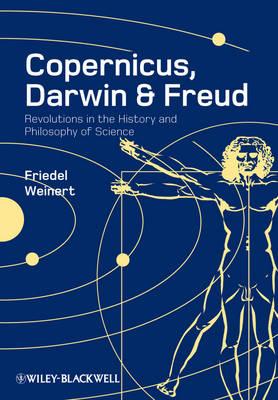Overview
Copernicus, Darwin, & Freud “Why is Darwin less the Copernicus than the Kepler of biology? What are good criteria for scientific revolutions? Shift of perspective? Replacement of paradigms? Reweaving conceptual networks? Explanatory gain? Restructuring the constraint space? Threatening worldviews? Whoever wants to learn more about these and many other important issues of history and philosophy of science will have to read on!” Klaus Hentschel, University of Stuttgart “Friedel Weinert has done a rare and excellent thing in this book: he has shown how the philosophy of science is intimately connected with the development of physical, biological, and social sciences and that argument concerning the foundations of these sciences cannot be advanced without reference to philosophy. It is a clearly written and engaging book that will be informative for teachers, students, and the lay public alike.” Robert Nola, University of Auckland
Full Product Details
Author: Friedel Weinert (Bradford University)
Publisher: John Wiley and Sons Ltd
Imprint: Wiley-Blackwell
Dimensions:
Width: 18.00cm
, Height: 2.30cm
, Length: 25.40cm
Weight: 0.699kg
ISBN: 9781405181846
ISBN 10: 1405181842
Pages: 296
Publication Date: 10 October 2008
Audience:
Professional and scholarly
,
Professional & Vocational
Format: Hardback
Publisher's Status: Active
Availability: Out of stock

The supplier is temporarily out of stock of this item. It will be ordered for you on backorder and shipped when it becomes available.
Reviews
Whether used as a textbook or as a review of issues concerning scientific revolutions and theory change in their historical context, Copernicus, Darwin, and Freud may be strongly recommended. (The Journal of the International Society for the History of Philosophy of Science, 2011) Those seeking a more conventional approach to the history and philosophy of science may well find Weinert's book informative...there is much to be learned from Weinert's comparison of Copernicus, Darwin, and Freud. (Science & Education, January 2011)?Weinert has provided an informative textbook that is written in a very accessible style. His examples invite the student to apply the philosophical concepts that are discussed.? (Metapsychology, May 2009)
Whether used as a textbook or as a review of issues concerning scientific revolutions and theory change in their historical context, Copernicus, Darwin, and Freud may be strongly recommended. (The Journal of the International Society for the History of Philosophy of Science, 2011) Those seeking a more conventional approach to the history and philosophy of science may well find Weinert's book informative...there is much to be learned from Weinert's comparison of Copernicus, Darwin, and Freud. (Science & Education, January 2011)“Weinert has provided an informative textbook that is written in a very accessible style. His examples invite the student to apply the philosophical concepts that are discussed. (Metapsychology, May 2009)
Whether used as a textbook or as a review of issues concerning scientific revolutions and theory change in their historical context, Copernicus, Darwin, and Freud may be strongly recommended. (The Journal of the International Society for the History of Philosophy of Science, 2011) Those seeking a more conventional approach to the history and philosophy of science may well find Weinert's book informative...there is much to be learned from Weinert's comparison of Copernicus, Darwin, and Freud. ( Science & Education , January 2011) Weinert has provided an informative textbook that is written in a very accessible style. His examples invite the student to apply the philosophical concepts that are discussed. ( Metapsychology , May 2009)
Weinert has provided an informative textbook that is written in a very accessible style. His examples invite the student to apply the philosophical concepts that are discussed. (Metapsychology, May 2009)
Author Information
Friedel Weinert is Professor of Philosophy at Bradford University and a former Visiting Research Fellow at Harvard University and Visiting Fellow at the Centre for the Philosophy of Natural and Social Science at the LSE in London. He holds a PhD in Philosophy, a BA in Sociology, and a BSc in Physics. Dr. Weinert is the editor of Laws of Nature (1995), the author of The Scientist as Philosopher (2004) and chief editor of the forthcoming Compendium of Quantum Physics: Concepts, Experiments, History and Philosophy.



